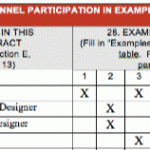
You submitted a proposal and lost. Now it’s up to you to figure out what happened.
So, what do you do? You ask for a debrief.
An agency head of construction management recently told me that he was relieved to just finish up the award of 54 contracts and the conducting of 76 debriefs.
Wow. That’s a lot of debriefs. Just imagine having to conduct that many debriefs. I told him that I’m probably the only sicko in the world who would have LOVED to sit through every one of them.
Debriefs are fascinating to me. Debriefs can help you win more proposals. But they can easily mislead you.
Here are three effective debriefing techniques to help you get the most out of your debriefs.
Always Take Debriefs With A Grain Of Salt
You must be realistic when it comes to how much of the story you expect to get from tactical debriefs. Nobody in their right mind is going to tell you they already had a firm in mind and the procurement was just a formality.
Nobody is going to tell you that they chose you, but then it went up to the Mayor’s office and the contract was given to another firm.
One top of that, there are two psychological principles working against clients wanting to give you the full story.
First, once we decide, we begin to feel stronger about that decision. If you go to the racetrack and place twenty dollars on a horse, as soon as that bet is made…you’ll feel strongly that it was the right decision. The same concept applies to a selection committee choosing a firm for a contract.
Second, it’s hard for us to articulate, or even know, what our decisions are truly based on. We might not understand the psychology of why we choose that brand of peanut butter when we were in the grocery store. And in the instances when we do understand our decisions, it’s sometimes hard for us to be honest with ourselves. And it’s even harder for us to verbalize that to others.
Gain A Better Understanding Of The Game Being Played
The reality is…just because you’re the best choice, does not mean you’ll win.
You must see procurement, especially with government agencies, for what it is: a game. And you cannot simply assume since you read the rulebook, you know how that game is played.
Every agency has different rules. Not only that, how each agency applies those rules can be different. The game that’s written on paper is not always the one being played.
For example, does the committee discuss the scores? And at what point? That can have a huge impact on the selection, especially if a firm has a vocal advocate on the committee.
How is this being scored? For example, some agencies give you a set of questions and score each answer from 1-5. However, is you get the “right answer,” they’ll give you a 3. Ratings of 4 and 5 are left to be given by evaluators when they feel a firm’s answer goes “above and beyond.”
Now that seems logical, right? But it’s not. In reality, the winning firm is determined by the grace of those committee members. If I like a firm, I’ll just give them arbitrary 4s and 5s.
Here’s my least favorite. The buyers list key phrases or concepts (more than could possibly appear in the space allotted). Then the procurement department, someone with no technical knowledge, goes through the proposals to determine which firm has the highest number of key phrases or concepts.
The nuances of each procurement make it critical that you understand how the game is being played. It is foolish not to incorporate the rules of the game into your proposal strategy.
Get Debriefs Even When You’ve Won
You might think that since you won, there’s no reason to get a debrief. Wrong.
These can be the most helpful debriefs. Clients are usually happy to give you debriefs when you win. It’s the easiest debrief for them.
It’s important, as I mentioned above, to take these debriefs with a grain of salt as well.
In these debriefs, you should look for “reasons’ given by multiple clients. If three different clients say they love your firm’s internal training program, that should inform your next proposal. It may even prompt you to ask what they liked about it.
Remember, as many people have already told you, by the time you get a debrief the decision has been made. You are not going to convince clients that they made a wrong decision. Don’t even try.
Instead, use these three critical debrief strategies to improve your chances of winning more contracts.
Now it’s your turn. Which debrief strategies have worked for you. Leave your answer in the comments.





Be brave, be strong – do everything in your power to convince the left-brained principals and projects managers of your firm to include you (the right brainer) in the debriefing session. It’s an important and frequently more objective perspective that often can’t be gained from a view clouded by the technical side that is so utterly convinced that its approach and expertise is superior to the winning firm and that the process was “rigged.”
In our firm, it is policy that the marketing staff perform the debrief. I have found that agencies are much more honest with us!
I have found that when debriefs are done they are only helpful if the knowledge is shared AND documented for future referencing. Many times I go back looking for documentation on a debriefing and can not find it. Too often we rely on our memory of the conversation, so I believe documentation is key!
It’s a wonderful article. Debriefs are so important to understand what is truly a game. To know the procurement mentality of the entity you are submitting to is key.
I loved the idea of a debrief for contracts you have won. To ask questions as to why and what they liked is understanding their mindset. Too often the number of proposals being submitted prevents spending critical time spent learning how to improve your proposals.
Thank you Matt!